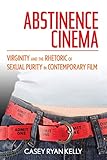Abstinence Cinema : Virginity and the Rhetoric of Sexual Purity in Contemporary Film / Casey Ryan Kelly.
Material type: TextPublisher: New Brunswick, NJ : Rutgers University Press, [2016]Copyright date: ©2016Description: 1 online resource (210 p.) : 10 photographsContent type:
TextPublisher: New Brunswick, NJ : Rutgers University Press, [2016]Copyright date: ©2016Description: 1 online resource (210 p.) : 10 photographsContent type: - 9780813575117
- 9780813575131
- 791.43/6538 23
- PN1995.9.V55 K45 2016
- PN1995.9.V55 K45 2016
- online - DeGruyter
- Issued also in print.
| Item type | Current library | Call number | URL | Status | Notes | Barcode | |
|---|---|---|---|---|---|---|---|
 eBook
eBook
|
Biblioteca "Angelicum" Pont. Univ. S.Tommaso d'Aquino Nuvola online | online - DeGruyter (Browse shelf(Opens below)) | Online access | Not for loan (Accesso limitato) | Accesso per gli utenti autorizzati / Access for authorized users | (dgr)9780813575131 |
Frontmatter -- CONTENTS -- ACKNOWLEDGMENTS -- Introduction: The Cinema of Abstinence -- 1. Melodrama and Postfeminist Abstinence: The Twilight Saga (2008-2012) -- 2. Man-Boys and Born-Again Virgins: The 40-Year- Old Virgin (2005) -- 3. Monstrous Girls and Absentee Fathers: The Possession (2012) -- 4. Abstinence, the Global Sex Industry, and Racial Violence: Taken (2008) -- 5. Sexploitation in Abstinence Satires -- Conclusion: Counternarratives -- NOTES -- FILMOGRAPHY -- BIBLIOGRAPHY -- INDEX -- ABOUT THE AUTHOR
restricted access online access with authorization star
http://purl.org/coar/access_right/c_16ec
From the perspective of cultural conservatives, Hollywood movies are cesspools of vice, exposing impressionable viewers to pernicious sexually-permissive messages. Offering a groundbreaking study of Hollywood films produced since 2000, Abstinence Cinema comes to a very different conclusion, finding echoes of the evangelical movement's abstinence-only rhetoric in everything from Easy A to Taken. Casey Ryan Kelly tracks the surprising sex-negative turn that Hollywood films have taken, associating premarital sex with shame and degradation, while romanticizing traditional nuclear families, courtship rituals, and gender roles. As he demonstrates, these movies are particularly disempowering for young women, concocting plots in which the decision to refrain from sex until marriage is the young woman's primary source of agency and arbiter of moral worth. Locating these regressive sexual politics not only in expected sites, like the Twilight films, but surprising ones, like the raunchy comedies of Judd Apatow, Kelly makes a compelling case that Hollywood films have taken a significant step backward in recent years. Abstinence Cinema offers close readings of movies from a wide spectrum of genres, and it puts these films into conversation with rhetoric that has emerged in other arenas of American culture. Challenging assumptions that we are living in a more liberated era, the book sounds a warning bell about the powerful cultural forces that seek to demonize sexuality and curtail female sexual agency.
Issued also in print.
Mode of access: Internet via World Wide Web.
In English.
Description based on online resource; title from PDF title page (publisher's Web site, viewed 07. Jan 2021)


